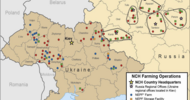
Emmanuel Saffa Abdulai, a human right lawyer, is director of Society for Democratic Initiatives, Sierra Leone
Obliterating Legal Rights in Large Scale Land Deals in Sierra Leone
Over the past fifteen years, since the declaration of the end of the war, Sierra Leone has attracted interests from investment in agriculture and other natural resource extractions from a number of Multi-National Corporations (MNC) from every corner of the world. The government of Sierra Leone has, with open arms, welcomed and embraced these MNC to directly inject foreign funds into a society rocked by years of neglect by previous regimes and a decade of rebel war.
However, these investments have created tensions in the face of land ownership, transfer of community land to third party, laws governing landownership, and basic existential rights such as the right to life and food of farming communities who own the land.
Sierra Leone’s land tenure revolves around communal ownership of any or all portion of land in rural or provincial areas outside of the capital. Meaning the government of Sierra Leone should have little say in ownership and allocation of the land to a third party. Customary law, not the statutory and common laws, mainly governs landownership, land rights, lease and allocation and other relationship with a third party intending to lease the land in these areas.
Customary law dictates that land belongs to the community and should be for the exclusive use and benefit of the community. As such, the chief is the custodian of the land, holding same for and on behalf of the community. The chief is traditionally bestowed with the responsibility of leading in the distribution and allocation of the community land to members of the community themselves. He is obligated to take decisions bordering on allocation of specific pieces of land together with other elders of the community. The community members are assigned land for individual farming purposes, or rarely for collective communal purposes.
As per tradition, community property cannot be sold out rightly to a third party. This certainly follows the laid down common law principle that ‘you cannot give what you don’t have.’ Like the communist system, a member of the community can use land belonging to the chiefdom through the express permission of the chief and other elders. Families are allocated pieces and parcels of land, which are used for farming over a long period of time. Interestingly, Chiefs are obliged to consult with other traditional leaders for an orderly distribution of land to avoid conflicts and any semblance of biasness.
I have had the privilege to review twenty large-scale lease agreements entered into by different communities with MNCs over the past years. From my review, it is clear that the customs and tradition of land ownership and the release of land to a third party has been grossly violated by the chiefs, chiefs have violated their fiduciary duties to serve as custodians of the land, and the third party soliciting to invest in the land have been mere bullies.
There is a legal obligation on a vendor to undertake comprehensive due diligence before entering into any lease, contractual or service agreement with another. In the agreements under review, due diligence seems to be absent in most of the large-scale lease agreements entered into in Sierra Leone. This is so because some of the chiefs grossly failed to consult with the chiefdom leaders, youth of the communities, and other beneficial landowners before executing the lease agreements with the MNCs. There have been challenges from Malen Chiefdom against the agreement on the grounds of lack of consultations with the community by the chiefs. In Malen for example, the MALOA six activists, who were jailed six months and fined thirty five thousand US dollars recently, argued that had consultations been properly held, the quantum and specific location of land leased out would have been better negotiated. They further argued that some of the lands are used by majority of the people for subsistence farming. Had SOCFIN, the Belgian company farming in Malen, undertaken the slightest of due diligence, these issues would emerged and problems averted.
In line with due diligence, some chief’s misrepresented the community leadership and claimed absolute ownerships of lands to the MNCs at the time of the signing of the agreement. Chiefs from Sahn Malen used their relatives and non-community leaders to counter-signed the agreement posing as elders in full misrepresentation, or better still impersonation, of the rightful owners of the land and elders of the communities.
Of the twenty-lease agreements under review, only three have a yearly rent of USD 5 per hectare of land per annum. The remaining seventeen agreements run between two, three, and four dollars per hectare of land per annum. Practically, taking the highest rent paid $ 5 per annum, the said highest rent is inadequate for the quantum of land acquired and deprivation that will follow. Considering how many families will loose livelihood land; or will have to travel miles to access land for farming, five dollar is just a mockery to the people.
In sync with the issue of rent is the standard loyalty of 5% prevalent in all the agreements. These loyalties are standard in large-long term agricultural lease agreements and thus applauded. Two shortcomings of the royalty provision are that, firstly, the agreements lack any mechanisms on how the loyalty could be calculated. Who determines profit margin in the face of a community disagreement with themselves over representation? These communities in the best-case scenarios have no ability and capabilities to ascertain the overall of profit of multinational investment companies. Second, the 5 % per annum loyalty is way too meager for the returns of investment, and the loss of farmland, waterway, and ancestral and cultural land by the people.
Interesting aspect of the land lease agreements is the corporate social responsibility (CSR) provisions, which are nicely crafted to provide legal escape routes for the investors. CSR are actions compelled on cooperation to provide basic services such as schools, roads and hospitals in communities whose resources are exploited and depleted. A common clause in the agreements is that the MNC should, ‘were reasonable,’ provide supports for primary and secondary level educations for children of affected communities. The word ‘reasonable’ appears to have taken the legal effects of CSR in this case. Modern international investments trend have ascended CSR to legal obligation level and MNC should now negotiate with communities to affect tangible CSR. Gone are the eras of discretional CSR, but the inclusion of the word ‘reasonable’ brings into play wider discretion into it. Further, who determines that CSR is due and when the profit margin is reasonably high enough to spare some for community developments?
Another striking aspect of the lease agreements, borders on the question whether the MNC can sublet or re-assigned the leased property. Legally speaking, long-term lease are re-assignable, therefore the large-scale land for agricultural purposes are no exception. However, in reassigning the land, the communities, or leasors, expressly consent to a sublease. Ideally, this will allow the communities to undertaken proper due diligence, or be informed, on the new tenants, purpose and risks with the new tenant. Contrary to the standards legal principle enunciated above, the lease agreements in Sierra Leone large-scale land acquisition tacitly take away the rights of communities to reject reassigning their land to unwanted sub-leasee.
A classic provision in twelve of the agreement is that subleasing is to be done with the consent of the locals, but the consent is only sort when “it is not unreasonably withheld.” Again the word unreasonable appears without guidelines or perimeters of issues that the agreement considers unreasonable. Who determines that consent is unreasonably withheld? Is it unreasonable to disallow another investment that will provide toxic to the community or endanger their environments? Are poor communities able to legally seek legal interpretations of what is reasonable in a court of law considering, firstly, their chiefs are chiefly complacent with the MNCS? And second, considering the poverty level, these communities cannot afford legal fees for sufficient and adequate legal representations.
A substantial but unanswerable question is who has a legal right and responsibility to enter into leasing community land. Are custodians- chiefs- entitled of the land, who are not sole owners, legally permitted to lease land without the consent of the rightful owners? The answer is in the negative. However many chiefs have sideline and marginalized their communities and entered into long term lease agreements with MNCs that benefits only themselves at the detriment of the masses who are the rightful beneficial owners. In fact there are strong allegations that the chiefs are bought, bribed with new houses, vehicles and access to free monthly allowances from the MNCs, which lubricated the signing of the agreements.
Baffling however is the lax provision that allows the MNC to not pay rent when renewal is due, but still allowed quiet enjoyment of the leased land. It is customary land law dictates in tenant-landlord relationship that failure to pay rent automatically ends the relationship and the landlord has a right to re-enter and re-possess the rented property. The tenant should be aware of the duration of his tenancy and does not have to be cajole into paying for the right to use someone else’s property. This is not the case with majority of the large-scale land agreements in Sierra Leone. Eighteen of the agreements stipulate that while the landlord, community, have a right to repossess their land if the tenants refused to pay rent, they may only do so only if ‘reasonable time is given to the tenant to ratify the failure to pay rent.’ Shocking as it is, it violates all legal rights of the landlord- in this case poor and helpless communities- to not only receive rent on time, but to the tenant to take, and use their property without paying considerations.
Two issues mired the process of contract making: first the land lease agreements are drafted by the MNCs and only presented to the chiefs, who are believed to have already been ‘incentivized’, to sign for and on behalf of the people. The chiefs themselves, apart from the bribery allegations, real or unreal they may be, have no legal background and do not understand the legal ramifications of some these clauses. The inequality of arms and the scandal about kickbacks render any such lease tainted. Any agreement created in such fashion is worth reviewing and challenged in the court of law on grounds of illegality.
Second, because the government supports the large acquisitions of land, government State counsels draft most of the agreements. ‘And so what’, One would be tempted ask. One, it is not permissible for state counsels to prepare legal documents for private client because they work for the government and should not render private practice while paid from the tax payers money. Only private practitioners have the right to do so. Two, with a state counsel at any negotiation with the chiefs, their mere presence portrays the impression that the Government of Sierra Leone backs the agreement. This caused chilling effects and smoothen the process.
From the above analysis, it is clear that the present crop of agreement that governs large-scale community land lease agreements with MNCS are not only tainted, but fraught with serious, challengeable, and voidable provisions. There is need to renegotiate these agreements particularly so to allow proper consultations, strong legal representation for the communities. Or else, going to court for specific impact litigation will be the only way out.
Emmanuel Saffa Abdulai, a human right lawyer in Sierra Leone and director of Society for Democratic Initiatives, Sierra Leone
Monday February 13, 2017












